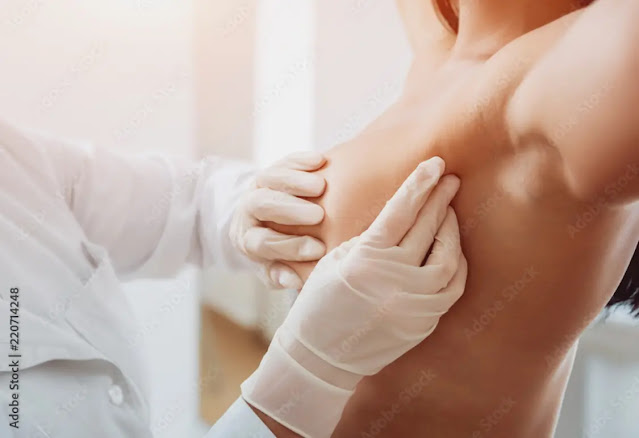Year-End Health & Beauty Reset: Prepare Smarter for the New Year | Hopajuinc


 |
| Supportive Family Image (Adobestock Photo) |
"You never know how strong you are until being strong is your only choice." — Bob Marley
"Breast cancer has hit close to home for me. It’s not something I ever imagined my family would have to deal with, but life has a way of surprising us. First, my mother received the news that she had breast cancer. Then, my aunt was diagnosed, and sadly, she passed away. Now, my cousin is going through the same journey. Breast cancer doesn’t just affect one person; it shakes entire families. And while it can be terrifying, knowing what to look out for, how to support a loved one, and what steps to take can make all the difference."
 |
| Perform regular self-exams and schedule mammograms (Adobestock Photo) |
Breast cancer is often discovered during routine screenings, but sometimes it’s the subtle signs that you notice in your own body. Here’s what you should keep an eye out for:
It’s important to perform regular self-exams and schedule mammograms. For me, after my aunt’s diagnosis, I learned how essential it is to get checked early and often. Early detection can truly save lives.
 |
| Conforting Woman consulting awith a doctor (Adobestock Photo) |
If you or a loved one receives a breast cancer diagnosis, it feels like the ground disappears beneath your feet. I’ve been there. The first thing to remember is that you are not alone, and the medical world has made incredible strides in breast cancer treatment. Here are the steps to take after diagnosis:
The symptoms of breast cancer vary, but some of the most common include:
 |
| Breast Exam woman at a doctor's appointment (Adobestock Photo) |
 |
| Bright,colorful image of healthy meals (Adobestock Photo) |
Nutrition plays an essential role in how you feel during breast cancer treatment and recovery. Some foods can help boost your immune system, fight inflammation, and give you strength:
What to avoid: During treatment, it’s best to avoid highly processed foods, sugary snacks, and alcohol, as these can affect your body’s healing process.
 |
| Smoking and Drinking alcohol interfere with treatment (Adobestock Photo) |
After surgery or treatment, it's important to let your body heal. Some things to avoid include:
Focusing on your mental health is also key. Treatments can take a toll, and it’s essential to seek emotional support when needed.
 |
| Woman of walks of life do the exams Regularly (Adobestock Photo) |
Breast cancer can affect women of any age, but it’s most common in women over the age of 50. This is often due to hormonal changes that happen with age, especially during menopause. However, younger women can still be at risk, particularly if there’s a family history of breast cancer, like in my family.
Knowing this, I encourage women of all ages to prioritize their health and get regular screenings.
 |
| Family Conforting healing (Adobestock Photo) |
Whether you’re going through treatment or supporting a loved one, self-care is crucial. For my family, staying connected emotionally has been a major factor in healing. Simple things like enjoying a walk, talking about feelings, or even cooking together helped us through the hardest moments.
Healing is more than just physical; it’s emotional too. After my mother’s treatment, we all found ways to focus on mental well-being, and I encourage anyone going through this journey to do the same.
Photo suggestion: A serene nature scene or a comforting photo of family spending time together to represent self-care and healing.
Final Thoughts: A Call to Action
In closing, breast cancer is more common than we might realize, and it’s crucial for all of us to be aware. If there’s one thing my family’s experience has taught me, it’s that early detection and support can make a world of difference. We can’t let our busy lives prevent us from checking in on ourselves and our loved ones.
So, to all the parents, sisters, daughters, and friends out there—please, take the time to educate yourselves, get screened, and encourage those around you to do the same. It could save a life.
When dealing with breast cancer, it's important to focus on supplements that can support the body during and after treatment. However, supplements should always be discussed with a healthcare provider to ensure they don’t interfere with treatments like chemotherapy or radiation. Here are some commonly recommended supplements for individuals with breast cancer:
Unlock the Power of Your Pineal Gland with Pineal XT
Did you know your pineal gland, often called the “third eye,” plays a crucial role in your overall health and well-being? It regulates sleep, mood, and even your sense of clarity and focus. However, modern lifestyles and stress can cause it to become sluggish or calcified. That’s where Pineal XT comes in. Our advanced formula is designed to detoxify, rejuvenate, and support your pineal gland, helping you tap into deeper mental clarity, better sleep, and a heightened sense of well-being.
Take control of your health and awaken your inner potential with Pineal XT—your key to unlocking the full power of your pineal gland!
Comments
Post a Comment
Thank you for your comment and please check our other blogs. We wait for you.